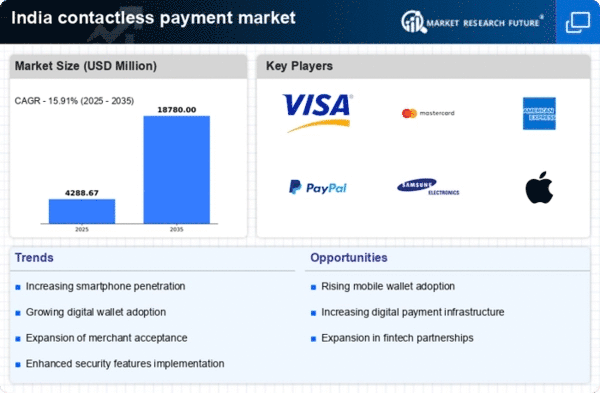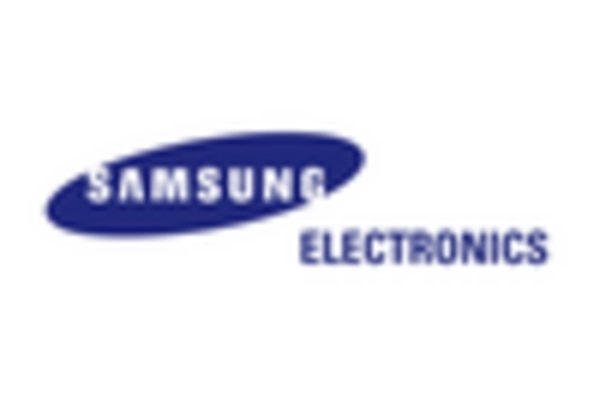Growth of E-commerce
The rapid expansion of the e-commerce sector in India is a significant driver for the contactless payment market. With the rise of online shopping platforms, consumers are increasingly opting for seamless payment solutions that enhance their shopping experience. As of 2025, e-commerce sales in India are projected to reach $100 billion, with a substantial portion of these transactions being conducted through contactless payment methods. This trend indicates a shift in consumer behavior towards preferring quick and secure payment options. The contactless payment market stands to gain from this growth, as businesses seek to integrate efficient payment solutions to cater to the evolving demands of online shoppers.
Rising Digital Literacy
The increasing digital literacy among the Indian population is a pivotal driver for the contactless payment market. As more individuals become proficient in using smartphones and digital platforms, the acceptance of contactless payment methods is likely to rise. Reports indicate that as of 2025, approximately 60% of the Indian population is digitally literate, which correlates with a growing inclination towards cashless transactions. This trend is further supported by government initiatives aimed at promoting digital payments, thereby enhancing the overall ecosystem for contactless payment solutions. The contactless payment market is poised to benefit from this surge in digital engagement, as consumers seek convenient and efficient payment options.
Consumer Demand for Convenience
The growing consumer demand for convenience is a key driver of the contactless payment market. As lifestyles become increasingly fast-paced, individuals are seeking payment solutions that save time and effort. Contactless payments offer a quick and efficient way to complete transactions, aligning with the preferences of modern consumers. Surveys indicate that over 70% of consumers in urban areas prefer contactless payment methods due to their speed and ease of use. This shift in consumer behavior is likely to propel the contactless payment market forward, as businesses adapt to meet the expectations of their customers by offering more convenient payment options.
Increased Smartphone Penetration
The surge in smartphone penetration across India is a vital factor driving the contactless payment market. As of 2025, smartphone users in India are estimated to exceed 800 million, providing a vast user base for contactless payment applications. This widespread adoption of smartphones facilitates the use of mobile wallets and contactless payment technologies, making transactions more accessible and convenient for consumers. The contactless payment market is likely to experience accelerated growth as more individuals leverage their smartphones for everyday transactions, thereby transforming the payment landscape in India. The integration of advanced technologies in smartphones further enhances the appeal of contactless payments.
Government Initiatives and Policies
Government initiatives play a crucial role in shaping the contactless payment market. The Indian government has implemented various policies to encourage digital transactions, including tax incentives for businesses adopting cashless payment systems. The Digital India campaign aims to transform India into a digitally empowered society, which has led to a significant increase in the adoption of contactless payment methods. As of 2025, the government has reported a 40% increase in digital transactions since the launch of these initiatives. Such supportive policies not only enhance consumer confidence but also stimulate the growth of the contactless payment market by fostering a conducive environment for innovation and investment.
















